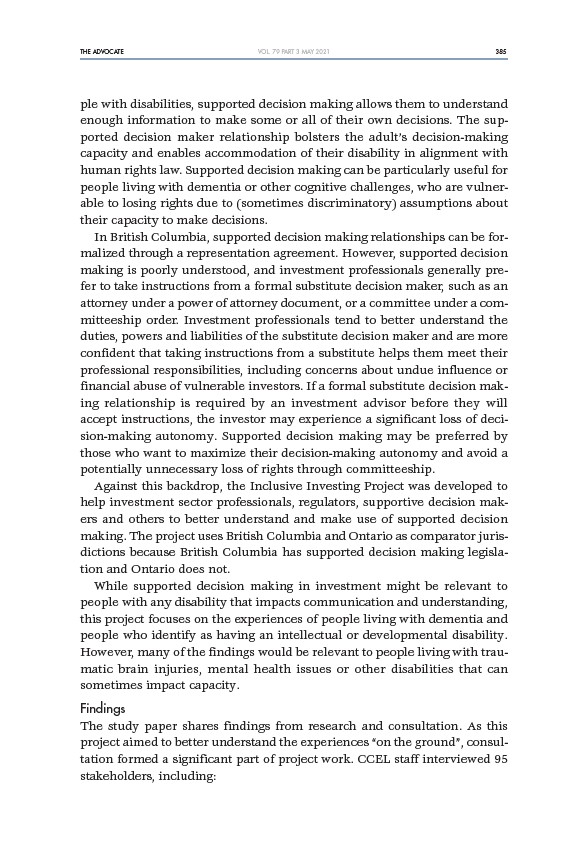
THE ADVOCATE 385
VOL. 79 PART 3 MAY 2021
ple with disabilities, supported decision making allows them to understand
enough information to make some or all of their own decisions. The supported
decision maker relationship bolsters the adult’s decision-making
capacity and enables accommodation of their disability in alignment with
human rights law. Supported decision making can be particularly useful for
people living with dementia or other cognitive challenges, who are vulnerable
to losing rights due to (sometimes discriminatory) assumptions about
their capacity to make decisions.
In British Columbia, supported decision making relationships can be formalized
through a representation agreement. However, supported decision
making is poorly understood, and investment professionals generally prefer
to take instructions from a formal substitute decision maker, such as an
attorney under a power of attorney document, or a committee under a committeeship
order. Investment professionals tend to better understand the
duties, powers and liabilities of the substitute decision maker and are more
confident that taking instructions from a substitute helps them meet their
professional responsibilities, including concerns about undue influence or
financial abuse of vulnerable investors. If a formal substitute decision making
relationship is required by an investment advisor before they will
accept instructions, the investor may experience a significant loss of decision
making autonomy. Supported decision making may be preferred by
those who want to maximize their decision-making autonomy and avoid a
potentially unnecessary loss of rights through committeeship.
Against this backdrop, the Inclusive Investing Project was developed to
help investment sector professionals, regulators, supportive decision makers
and others to better understand and make use of supported decision
making. The project uses British Columbia and Ontario as comparator jurisdictions
because British Columbia has supported decision making legislation
and Ontario does not.
While supported decision making in investment might be relevant to
people with any disability that impacts communication and understanding,
this project focuses on the experiences of people living with dementia and
people who identify as having an intellectual or developmental disability.
However, many of the findings would be relevant to people living with traumatic
brain injuries, mental health issues or other disabilities that can
sometimes impact capacity.
Findings
The study paper shares findings from research and consultation. As this
project aimed to better understand the experiences “on the ground”, consultation
formed a significant part of project work. CCEL staff interviewed 95
stakeholders, including: